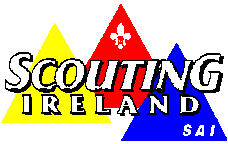 |
1st Meath (Dunboyne) Scout Camping |
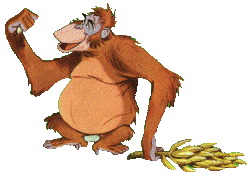 |
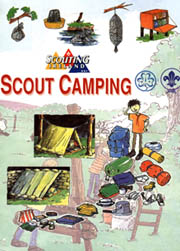 Camping: There are few better ways to discover the
world of nature than by taking a camping holiday. As well as the
daytime adventures of exproling the countryside, there's the
excitement of sleeping under canvas or even under the stars.
Camping: There are few better ways to discover the
world of nature than by taking a camping holiday. As well as the
daytime adventures of exproling the countryside, there's the
excitement of sleeping under canvas or even under the stars.
For a beginner camping may
be a bit rough at first but you soon find loads of ways to make
it comfortable. Heading off and getting away with your friends
makes it really worthwhile
There are lots of different ways to go camping. Although you'll
cover more distance on wheels than on foot, without a special
mountain bike you'll be limited to tarmac roads and carrying all
you need can be difficult. If you're planning to keep on the
move, make sure you travel light. One way of avoiding the weight
problem is to choose one site as a base cap for day trips.
![]()
Kit List
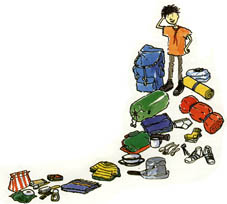
ACTIVITY GEAR |
EATING GEAR |
SLEEPING GEAR |
CLEANING GEAR |
 Pack a Rucksack: Try to fit everything
inside the rucksack. Pack clothes in plastic bags to keep them
dry. Bring extra in case you need to pack wet gear.
Pack a Rucksack: Try to fit everything
inside the rucksack. Pack clothes in plastic bags to keep them
dry. Bring extra in case you need to pack wet gear.
Adjust the straps on the rucksack properly. The waist
strap should take the weight.
The items you may need in a hurry should be easily reached
- keep your rain gear near the top!
Know where everything is. Always pack things in the same place
The rucksack should be balanced and comfortable to wear so
do not put all the heavy things on one side. Keep them near the
middle and pack the soft things so they are against your back.
Try to fit everything inside.
If you are bringing a hot drink, why not bring hot water in sa
flask - then can make more than one type of drink Ilike soup or
hot chololate). If a flask full of water gets broken, the mess is
not as bad!
Country
Code:
- Respect farmers, their land, machinery, crops and livestock.
- Respect wildlife.
- Guard against the risk of fire.
- Leave gates as you find them.
- If you have a dog, keep it under control.
- Do not damage fences or walls.
- Get permission to walk across private property and stay on
path.
- Leave livestock, crops and machinery alone.
- Take all your litter home.
- Do not damage wildlife, plants or tress.
- Make no unnecessary noise.
- Do not pollute water.
Lighting a Fire:Toasting your toes around a campfire is one of the best ways to end a day in the country, especially if someone has a harmonica or a guitar to get a singsong going. And with a little care and attention, a fire can be as safe it is enjoyable. Make sure that you collect all the wood you need before it gets too dark to find it, and never cut fresh wood from trees or bushes.
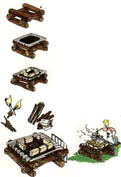 Making a Campfire:
Making a Campfire:
Fire lighting and conversation Firstly, collect enough firewood. Green (fresh) wood is no good nor is damp wood that has lain on the ground too long. To make your fire, get kindling; shavings, splinters, or any other material that will catch fire easily. Above this kindling, place twings in pyramid fashion. Then add a few slightly thicker sticks to make the fire. Have a wood pile ready you light your fire.
Tip: A good kind of kindling can easily be made by splitting a stick into several slices or shavings. This is called a fuzz stick. If stood up, with the shavings pointing to the ground, it quickly catches fire and flares up.
Camping Layout
Why not draw a picture of your ideal campsite showing the layout of the tents.
A good campsite should be flat and level, well drained, near drinking water and sheltered from the weather.
Games area should be away from the cooking area, the fires and the tents.
When you are camping, the layout of your camping is important. You shoud consider things such as not putting the cooking area besides the toilets, bins beside the food store. Remember to put your cooking fires or campfire site far enough away from the tents so they are not dangerous. Fires should be downwind from the tents.
Outdoor Kitchen
Storing food is an important health aspect of camping. Apart from being safety stored, care must be taken to protect the food from insects and animals. Keep fruit and vegetables in a string bag or larder hung from a tree or in a store tent. Food like cheese and milk can be stored in a cool box. Use the box in which which you transported the pot and pans to camp as a storage box for thing like jam, sugar, coffee, bread, cereals.
Tips: Milk and butter cam also be placed in a basin of a water and covered with a damp cloth, the cloth will soak up the water and evaporation will have a cooling effect. If there is a stream nearby, food can be placed in to keep cool by putting the food in a plastic container or plastic bag and tied to the bank.
The Sky at Night
Tips: These constellations can also be used as signposts to spots other constellations. Use the Pointers of the Plough the other way to find Leo (The Lion). The plough's handle points to Bootes (The Plough-man) and Corona Borealis (the Northern Crown). Use the pointers on the plough to find Polaris and you have also found Ursa Minor (The Little Bear). and if you continue the same distance past Polaris you'll easily find the W shaded constellation of Cassiopeia.
Follow the line formed by the three distinctive stars that make Orion's belt to the left to find Canis Major (The Big Dog) which has the brightest star in the northern skies (Sirrius). To the right of Orion's belt is the distictive v-shaped constellation of Taurus (The Bull) and a lovely star group called Pleaides (The 7 Sisters).
Star spotting is best done away from the glare of steet lights. Avoid using a torch letting your eyes adjust to the night vision. A pair of binoculars are good for observing the moon. The best time to see the moon's crators is in a cresent moon/
Beavers|
Cubs|
Scouts|
Ventures|
Leaders
 Rule on for the camp cook is 'keep it simple'. Preparing fussy isn't easy in a well-equipped kitchen, let alone at a camping.
Rule on for the camp cook is 'keep it simple'. Preparing fussy isn't easy in a well-equipped kitchen, let alone at a camping.
Rule two is 'keep it clean' - don't get grass or dirt in the food. Wash your hands before handling food, clean and put away your pots, pans and crockery.
Rule three is 'cut down on the pots and pans'. As well as being tasty, one-pot meals such as stews will leave your assistants with less washing-up to grumble about!
Rule four is to ensure variety, not only in what you eat but you cook it. You can fry, boil, roast, eat cold i.e. salad or sandwiches.
Put your pots and pans away clean after each meal. While you are eating have a pot of water on the fire warming up to do the dishes afterwards.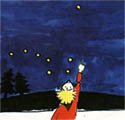 Even without a map and compass you can still find your way at night using the stars as your guide. The best cinstellation to use is Ursa Major (The Gear Bear), often called the Plough. The pair of stars called The Pointers point directly to the North Star, "Polaris", when you face Polaris you are looking North, East is on your right, South behind you and West will be on your West.
Even without a map and compass you can still find your way at night using the stars as your guide. The best cinstellation to use is Ursa Major (The Gear Bear), often called the Plough. The pair of stars called The Pointers point directly to the North Star, "Polaris", when you face Polaris you are looking North, East is on your right, South behind you and West will be on your West.
Anothe star constellation which is useful in finding North at certain times of the year is Orion (The Hunter). If you imagine a line running from the middle star of Orion's Belt and through the group of smaller stars which forms his head, this line also points to the North Star.
Who we are|
What we do|
Events|
Scouting in Ireland
News|
Games|
Message board|
Links|
Webrings|
Support
Home